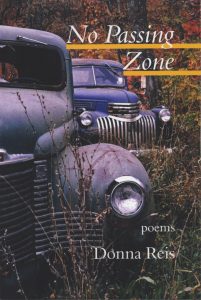 I fell in love with Dona Reis’s poems when I read “Going for Coffee after an Al-Anon Meeting,” which Snake Nation Press published. In the poem, the different wives talk about how their husbands might die and what they would wear to the funerals. In fact, the poem starts off with the lines,
I fell in love with Dona Reis’s poems when I read “Going for Coffee after an Al-Anon Meeting,” which Snake Nation Press published. In the poem, the different wives talk about how their husbands might die and what they would wear to the funerals. In fact, the poem starts off with the lines,
“To get through each day / I kill my husband, Sandy says.”
The poem goes on with three women, Sandy, Lynette, and Cheryl, each envisioning how her husband will be killed and what they will wear to the funerals. “How can he complain about the $1,200 / price tag when it’s for his funeral?”
One cannot help but laugh, but also be aware that there is another layer, that these three have alcoholics in their lives. Whether it’s a sibling, a parent, or a husband is not addressed, but the reader is aware or otherwise these women wouldn’t be going to an Al-Anon meeting.
In her book of poetry, No Passing Zone, Ms. Reis has that wonderful ability to write about ordinary things from an odd angle, or at least from an angle that she has considered or never considered. It’s wonderful both ways. But you’re never in doubt of what she’s talking about even if the actual deed is not mentioned, such as “Sleeping with the Carpenter.”
What do we want from poetry? Why do we read poetry? Even more interesting to me, as a writer, reader, and editor is: Why do we write poetry?
A long time ago, Janet Burroway, a professor at Florida State University, read a very revealing poem. Later, I asked her, “How did you have the courage, the nerve?” She answered, “I want to know myself and to be known.” To me it was a very good answer.
“To know yourself and to be known,” is what the reader will find in Reis’s poems. You will recognize yourself and know her, too, to some extent from her experiences, in “Still Life” the hit-and-run accident she endured, and also in the trials of women with difficult husbands—are there any other kind? Even brothers and male friends can be difficult because we are the nursemaids and cooks, as we are all too aware of in “Dorothy at Grasmere.” Maybe I should say life is difficult rather than place that word on all men’s shoulders.
There’s a lot of humor in the poems in No Passing Zone, along with a lyrical quality to the words that carries the reader from line to line. I especially like “Everything You Need to Know about Ghosts” because of the last line: “Don’t count on them / for anything so practical as finding your keys, / because they are undoubtedly / the ones who hid them.”
—Roberta George